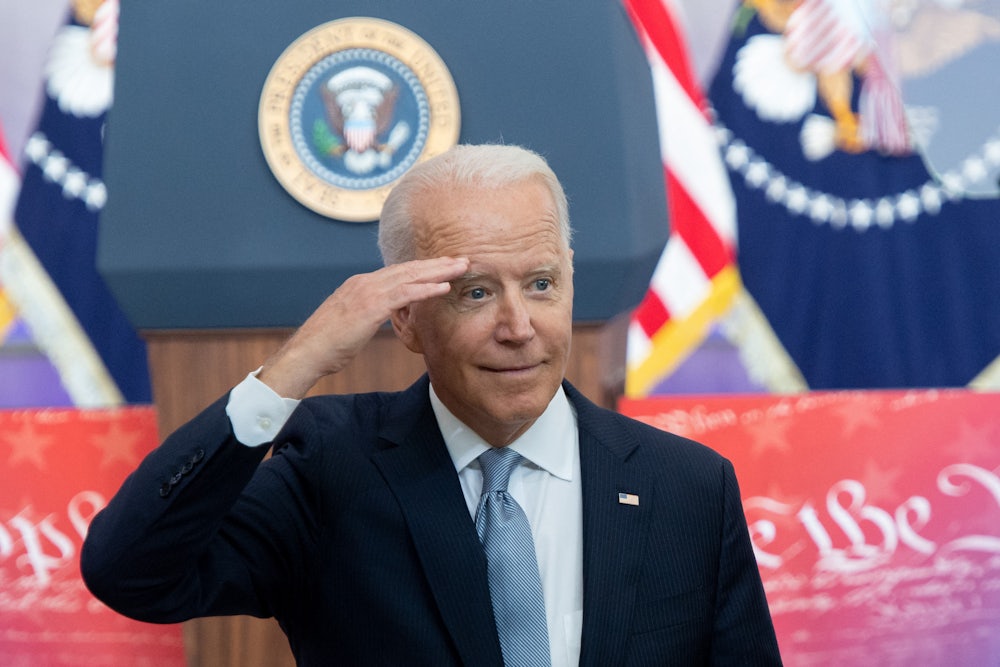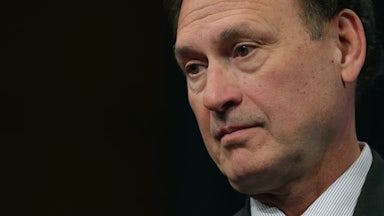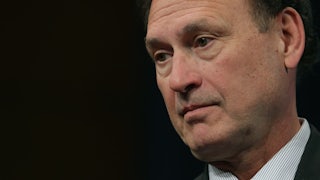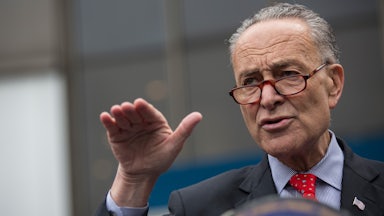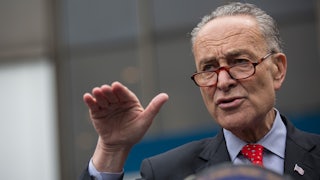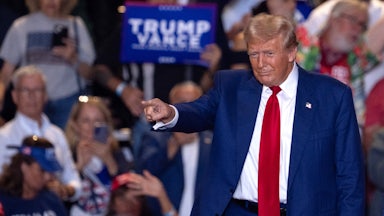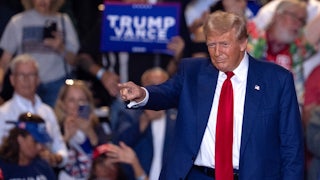President Joe Biden effectively conceded defeat on passing two major voting rights bills in Congress on Tuesday, pointedly declining to throw his political weight behind filibuster reform and urging private groups to find alternate means to resist voter suppression in lieu of strengthened federal protections. “Legislation is one tool,” Biden told the audience, “but not the only tool.”
The president’s speech at the National Constitution Center in Philadelphia carried dire warnings about the state of American democracy. Biden declared that efforts to thwart GOP-led restrictions on voting are “the test of our time.” He described the wave of bills in Republican-led state legislatures across the country as “the twenty-first-century Jim Crow.” He offered grim predictions for the future, warning that Republicans’ “election subversion” efforts are “the most dangerous threat to voting and the integrity of free and fair elections in our history.” He told Americans that the eyes of the world and of history were upon them.
Biden’s substance fell far short of his rhetoric. Nowhere in the address did Biden mention the filibuster, which allows a minority of Republican senators to block any voting rights legislation from making it through the chamber. Earlier this year, Biden expressed some support for modest reforms, such as the so-called talking filibuster, that would make the practice harder to sustain. But he appeared to back down from that position on Tuesday. His speech included no call for even minor filibuster reforms, nor did it put any serious pressure on known Democratic holdouts, such as Arizona’s Kyrsten Sinema and West Virginia’s Joe Manchin, to rethink their entrenched position.
The filibuster’s absence from Biden’s remarks lent a surreal air to the rest of his speech. At one point, he urged Congress to send both of the major voting rights bills under consideration to his desk for a signature. “We must pass the For the People Act,” he told the audience. “It’s a national imperative. We must also pass the John Lewis Voting Rights Advancement Act.” Republicans successfully filibustered the For the People Act last month, and it appears no closer to passage now. It was as if Biden had urged lawmakers to meet him on the other side of the Grand Canyon without saying how they should get across.
Biden and his administration have cast the struggle over voting rights and voter suppression as an existential battle for American democracy. Vice President Kamala Harris, speaking on the same topic last Thursday at Howard University, called it “the fight of our nation’s lifetime” and framed it as a continuation of past civil rights battles. “These laws create obstacle upon obstacle,” she warned. “These laws make it harder for you to vote because they don’t want you to vote. And so I will say again, your vote matters. Your voice matters.”
As with Biden’s speech this week, however, the filibuster’s role in stymying voting rights bills went unmentioned. Harris instead used her Howard address to outline a new voter-protection project at the Democratic National Committee. “With this $25 million, the Democrats are investing in the tools and technology to register voters, to educate voters, to turn out voters, to protect voters,” she told the audience. Her remarks acknowledged the intense grassroots pressure on the administration to take action. “People say, ‘What’s the strategy?’” Harris said. “Well, I just outlined it.”
The White House’s tacit admission of defeat came even as calls for filibuster reform intensified in Democratic circles. House Majority Whip Jim Clyburn, a major Biden ally, told Politico last week that Biden should “pick up the phone and tell [West Virginia Senator] Joe Manchin, ‘Hey, we should do a carve out.’ I don’t care whether he does it in a microphone or on the telephone—just do it.” Since it’s unlikely that Democratic senators would abolish the filibuster in its entirety, some voting rights leaders have instead argued that a carve-out for voting rights would be justified.
But White House Press Secretary Jen Psaki almost immediately nixed the idea on Monday. “The president’s view continues to be aligned with what he has said in the past, which is that he has not supported the elimination of the filibuster because it has been used as often the other way around,” she told reporters at a press briefing. Ahead of Biden’s address in Philadelphia, Harris told NPR that she was “having conversations with folks” about filibuster reform, an apparent reference to Clyburn, but explicitly declined to go beyond the administration’s line on the matter.
Perhaps the strangest moment of Biden’s speech came when he criticized the Supreme Court’s ruling last month in Brnovich v. Democratic National Committee. His criticism was well founded: Justice Samuel Alito’s majority opinion lawlessly rewrote a key provision of the Voting Rights Act of 1965 to make it easier for states to pass unequal restrictions. It’s hard to avoid the fact that three of the six justices in the Brnovich majority were only confirmed after Republican senators created a carve-out in the filibuster to confirm them. Despite his opposition to the ruling, Biden still refused to support a carve-out to limits or reverse the high court’s rulings on voting rights.
The Biden administration hasn’t completely abandoned the battle to protect voting rights from state-level attacks, of course. Last month, the Justice Department filed a Voting Rights Act lawsuit against the state of Georgia for its controversial slate of new restrictions on absentee ballots and polling places. Other lawsuits could soon follow. But Biden all but closed the door on Tuesday to going any further at the federal level. “Democracy or autocracy? That’s what it’s coming down to,” he declared. One side in that struggle is fighting with brand-new weapons. The other will have to simply make do with what’s left.
